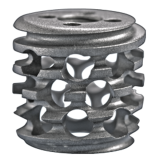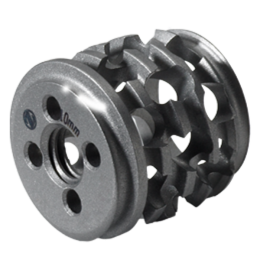Ürün Açıklaması
BAK / C Anterior Servikal füzyon Sistemi servikal omurganın dejeneratif disk hastalığı yaşayan hastalar için rahat bir seçimdir. BAK / C sistemi dekompresyon, kemik yatağı hazırlığı ve implantasyon sırasında kemik toplar. İmplant odasına kemiğin kendini ambalaj yerel otogreft üretir ve iliak kanattan hasat ihtiyacını ortadan kaldırır.
Özellikler
- Benzersiz tasarımı cihazın implantasyonu sırasında lokal otogreft toplamak için izin verir
- Pahlı kenar kolay takılmasını sağlar
- Titanyum alaşımlı yüksek yorulma dayanımı sağlar
- Hollow, gözenekli tasarımı, tüm taraf aracılığıyla boney büyüme sağlar
- Hastanın anatomisi değişen karşılamak için birden fazla boyutta mevcuttur
Device Description
The BAK/C® Interbody Fusion System consists of hollow, perforated, threaded, cylindrical implants. The BAK/C implants are available in several diameters to accommodate variations in patient anatomy; all implants are 12mm in length. Implants are made from titanium alloy (Ti-6A1-4V), conforming to ASTM F136. Instruments designed for implantation of implants are made from stainless steel. Implants may be implanted singularly or in pairs at the affected disc level. Refer to the Surgical Technique Manual for additional information on how to use these devices.
Indications
The BAK/C implant is indicated for use in skeletally mature patients with degenerative disc disease (DDD) of the cervical spine with accompanying radicular symptoms at one disc level. DDD is defined as discogenic back pain with degeneration of the disc confirmed by history and radiographic studies.BAK/C mplants are used to facilitate fusion in the cervical spine and are placed via an anterior approach at the C-3 to C-7 disc levels using autograft bone.
Contraindications
BAK/C devices should not be implanted in patients with an active infection, or an allergy to titanium or titanium alloy.
Safety Information
As with any surgical procedure, inherent risks are present and precautions should be taken.Surgeons should not implant the BAK/C Interbody Fusion System until receiving adequate training in the surgical technique. In the clinical study of patients receiving the BAK/C device, the most common adverse event was degeneration of an adjacent disc (6%).Other adverse events that are possible with cervical spinal surgery include paralysis, displacement or breakage of the implant, injury or damage to adjacent bones, discs or soft tissues, or death.
For a complete list of warnings, precautions and possible adverse events, please refer to the product IFU or contact your Zimmer Spine Sales Representative. This document is written for professional medical audiences. If you have questions regarding the currency of this information, contact Zimmer Spine.








